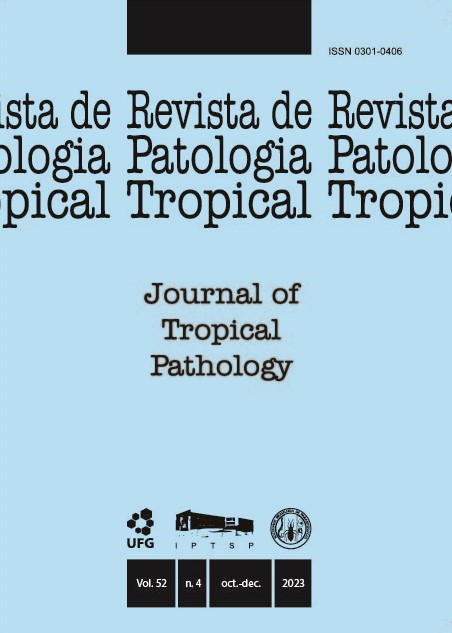Epidemiological profile of intestinal parasites in children under five years of age in Maputo, Mozambique
DOI:
https://doi.org/10.5216/rpt.v52i4.76231Abstract
Intestinal parasites are one of the most sought-after causes in pediatrics. Its occurrence is one of the indicators of socioeconomic status that may be associated with several sociodemographic factors. It is estimated that approximately 50% of the vulnerable population is parasitized with one or more types of parasites, such as children. Considering that this population is essential for human development, the goal of this work was to evaluate the epidemiological profile of intestinal parasites in children up to five years of age in Maputo, Mozambique. To this end, a cross-sectional descriptive study was done with 70 children, through the application of a questionnaire with content related to sociodemographic conditions, clinical profile and identification of the patient’s parasitosis. A stool sample was also requested for parasitological analysis by Ritchie concentration, Ziehl-Neelsen and rapid test techniques. From the 70 children, 36 (51.4%) were infected with at least one intestinal parasite, with Ascaris lumbricoides and Trichuris trichiura being the most prevalent. Furthermore, it was possible to observe a direct correlation between basic sanitation and intestinal parasites. Fever symptoms were also correlated with the presence of intestinal parasitism. Although the government of Mozambique has adopted since 2009 a policy of massive drug administration to deworm children, the high rate of intestinal parasites remains present in the population. Therefore, preventive measures must be taken to contribute to the reduction of this rate of intestinal parasites in this population.
KEY WORDS: Public health; Mozambique; kids; intestinal parasites.
Downloads
Downloads
Published
How to Cite
Issue
Section
License
The manuscript submission must be accompanied by a letter signed by all authors stating the full name and email address, confirming that the material has not been published or is under consideration for publication elsewhere, and agreeing to transfer copyright in all media and formats for Journal of Tropical Pathology. The authors will not be paid for published articles. They are solely responsible for the content of those articles, even if the Editor holds the right to adjust them to the norms of the journal.
The reviewers will not be paid for the peer review process.

